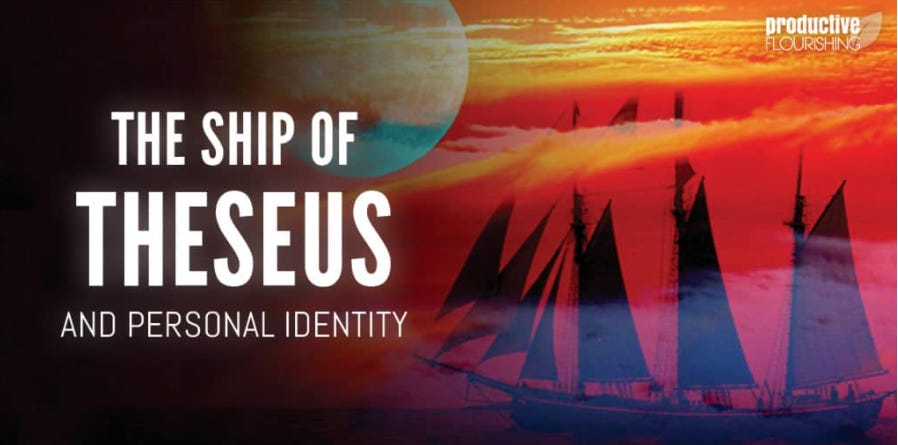The Ship of Theseus and Personal Identity
How a classic philosophical puzzle can help us unlock answers about personal identity.
What makes you you? Such a simple question is surprisingly hard to answer. (Tweet this.)
The Ship of Theseus is a classical philosophical puzzle about personal identity. I'll give the quick version. (Note: if you're a professional philosopher, you will not be happy with the quick version. But you likely won't be happy with much of anything I write here, anyway.)
Imagine you have a wooden ship in your backyard and decide that one day you want to take it apart piece by piece. You go about taking it apart, delicately removing each part as if you were going to use those same parts to rebuild it later (should you decide to do so) and storing it in your garage.
Now, here's part of the problem. When you remove each piece, it still seems to be (intuitively) the same Ship. Removing one plank from the floor, for example, doesn't seem to make it a different ship. However, if you keep up with the process, you will end up with all of the pieces of the Ship in your garage, but it will no longer be the Ship of Theseus, since, by hypothesization, you won't have a ship - you'll have a pile of wood that used to be a ship.
But at some point in your deconstruction, the Ship had to move from existence to non-existence, unless you want to say all the pieces in the garage is the Ship. At what discrete point did the Ship cease being the Ship?
A further wrinkle: suppose that, rather than just tearing the Ship apart, you decide to replace every wooden piece you removed with an aluminum piece of the exact same dimensions. So, when you start, you have a completely wooden Ship, but at the end, you have a completely aluminum Ship. But, at each discrete stage of time, you only have a ship that is one piece different than it was in the previous moment.
An even further problem: suppose that you decide to use the wooden planks you removed in the case above to build another Ship, which is materially identical to the original ship. At the end of that project, you'll have two Ships, one aluminum and one wooden, that each have a claim to being the Ship of Theseus. They can't both be THE Ship of Theseus, but it could be true that they both could NOT be the Ship of Theseus, but the problem becomes, when was the Ship of Theseus destroyed?
A few options:
The Ship of Theseus is what it is by the individual parts that make it up.
In this case, the second you removed the first wooden plank from the Ship, it ceased to be. But the individual atoms in the wood are forever changing, with the result that the Ship is never itself.
The Ship of Theseus is what it is because of its structure.
In this case, the Ship remains the same ship throughout the change from wood to aluminum, so you have the seemingly contradictory result that the Ship of Theseus is both an aluminum and a wooden ship. Furthermore, when you have two ships (as in the last thought experiment), they both have identical structures, so you wind up with the result that both are THE Ship of Theseus - meaning that two discrete things are one numerical thing.
The Ship of Theseus is what it is because of its history.
In this case, the Ship remains the same because of its particular role in the history of the world. Parts come and go, but the actor remains the same. You'll still wind up with the problem in the case of Theseus duplicates, because each share a relevant history with the "original" ship.
The Ship Represents Us
Now, the real problem is not at all about ships, but instead about that that makes us who we are. We know that parts of who we are change from year to year, but we still think we're the same people.
Is it because of our parts — i.e. the individual matter that makes us up? Breathe, and you're no longer the same you.
Is it because of our structure? Lose a limb or cut your hair and you're no longer the same person.
Is it because of our history in the world? Were you to be duplicated, you'd either have an existential twin, or you'd cease to be.
Is it because of our thoughts, feelings, and all the other stuff that goes on in our heads? Lose your memories, and you're no longer you. Have a radical change of heart, and the person you were once before is gone.
Is it because of our souls? Souls could logically be duplicated and would run the same risks of the Ships. (Sidebar: soul talk, in general, is a way to understand what it is that is us through time. Our physical bodies come to pass and theories of personal identity that posit spiritual existence before and after physical existence have to have some device to allow for identity through the different phases of our existence.)



